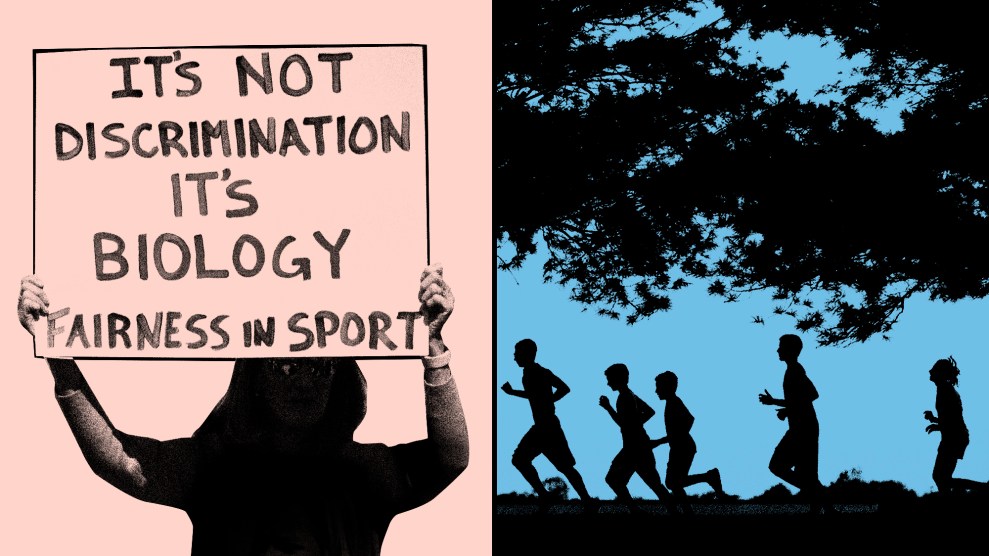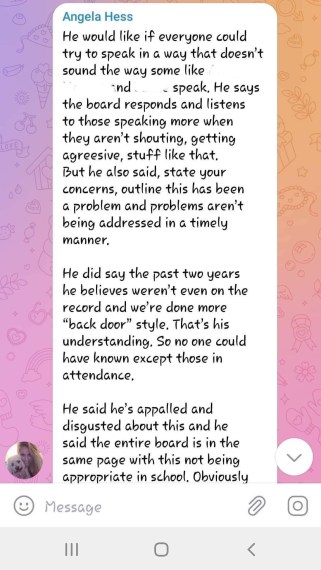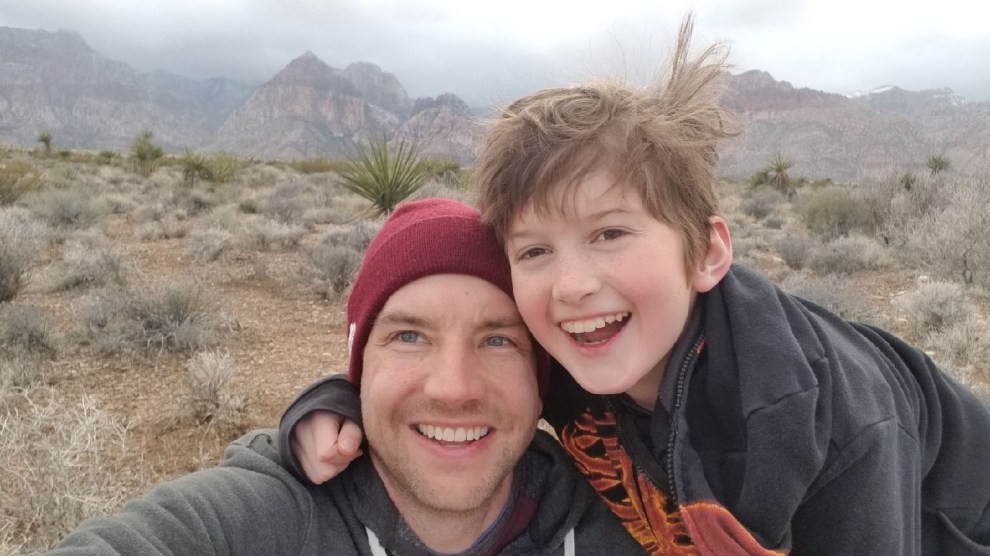
Mother Jones illustration; Samuel Metz/AP, Larry Deklinski/ AP
Oliver Wenditz, who goes by Ollie, catches me up on the goings-on at my old school in Lancaster County, Pennsylvania. Though we’re separated by close to 20 years, we adore the same art teacher, love printmaking, and do theater. But I had no hand-eye coordination, and Ollie, an eighth-grader, hopes to play basketball in the spring.
But he’s not allowed. Ollie is trans. And in July, after more than a year of debate, Hempfield School District’s all-Republican board became the first in Pennsylvania to ban transgender athletes from competing with their cisgender peers. The district sits where a diverse, Democratic county seat meets a red sea of farms and Rust Belt towns. Plenty of conservatives live here, but Hempfield’s trans ban goes way past local backlash: It’s a blueprint for public schools across the country, drawn up by some of the Christian right’s best lawyers.
Kids here faced homophobia and transphobia when I attended, sixteen years ago, but I never expected our schools to be ground zero for a project like this. In my attempt to find out what happened, I found a backer ready for legal war, up to and including the Supreme Court. I found a means to attack trans youth in purple and blue states, a school board hidden from the public eye, and a principal pushed out for supporting queer kids. And, of course, I found far-right gubernatorial candidate Doug Mastriano.
It’s significant that Hempfield is Pennsylvania’s first school district with a trans sports ban. It’s large and well-regarded: the second-biggest of 16 districts in the county, all but two of which answer to GOP boards. Just weeks after Hempfield deployed its trans ban, two neighboring districts said they might do the same. It’s even more significant that it’s being enacted as school policy, not law. Unlike recent state-level attacks on trans athletes, Hempfield’s rule offers a template for right-wing school boards in states where legislatures are less likely to act against trans kids. It’s bound to face a court challenge, and this community is more likely to field one than some nearby deep-red district. But the people who wrote it know that.
Enter the Independence Law Center, an arch-conservative foundation of “family values” attorneys. ILC, part of a sprawling Christian nationalist legal network, stepped in to craft Hempfield’s trans sports ban. The group boasts resources typically out of reach to school boards, with higher-court wins and Supreme Court briefs under its belt. Its anti-abortion, anti–marriage equality, anti-trans parent organization works closely with the Alliance Defending Freedom, a rich and connected Christian nationalist org designated a hate group by the Southern Poverty Law Center.
ADF, whose funding and support helped get ILC on its feet, claims thousands of affiliated lawyers—and, as the Guardian reports, cultivates extremist policy worldwide:
In the last decade, ADF attorneys argued in favor of state-sanctioned sterilization for trans people at the European Court of Human Rights…In Belize, the group sided with another organization pushing to criminalize gay sex. In India, the executive director applauded a supreme court decision ruling gay sex illegal (that was struck down in 2018). In Romania, ADF pushed for a referendum to oppose same-sex civil unions. In Jamaica, ADF attorneys defended anti-sodomy laws.
The group has argued before the highest court on ten occasions. It says it’s played a role in 47 Supreme Court wins for “family values,” macheting legal paths that local partners can follow. Its lawyers pivoted to youth sports after the backlash to anti-trans “bathroom bills,” a drive it spearheaded, as my colleague Samantha Michaels covered in 2016:
Over the past few years, the group has worked to shape the national debate over transgender people’s access to public bathrooms. Back in December 2014, ADF sent a letter to school districts across the country with a recommended policy that would require transgender kids to use private bathrooms or the multistall bathrooms corresponding with their birth sex. In the following months, it also proposed model legislation to state assemblies, calling for similar restrictions. In many cases, lawmakers appear to have mirrored or even copied the group’s draft while crafting their own bills.
That’s shaped national and local conversations. Ahead of next week’s election, the right has made trans sports bans as much a plank as abortion or inflation. House Minority Leader Rep. Kevin McCarthy’s GOP policy agenda declares that “only women can compete in women’s sports,” as GOP candidates who had expressed support for transgender people—like the party’s candidate to govern Arizona, election denier Kari Lake—pivot to campaigns that vilify trans kids. In Pennsylvania’s legislature, Republican gubernatorial hopeful Doug Mastriano is co-sponsoring a bill that would force trans women onto men’s teams throughout its more than 3,000 public schools. If Mastriano wins his race, Pennsylvania will almost certainly become the nineteenth state to legislate against trans athletes.
Where the Alliance Defending Freedom blazed paths, the Independence Law Center followed. The smaller group partnered with ADF for its highest-profile case: a 2017 suit against a Philadelphia-area school district on behalf of a student whose trans schoolmate used his locker room. ILC lost, but kept taking cues from its senior partner: switch to sports, write model policies, help them spread.
Rewind to 2021. In early spring, a sophomore girl who had recently transitioned signed up for women’s track and field. The district’s first out trans athlete, she’d run cross-country last season with Hempfield’s boys. Officials hesitated. But then-principal Jim Dague, a former field hockey coach, knew that Pennsylvania Interscholastic Athletics Association left the decision squarely with him. And school sports, Dague believes, are here “first and foremost to give kids opportunities to be part of something bigger than just themselves.”
So the girl would run.
The backlash was almost immediate. By April, her participation was a major talking point at board meetings. By June, disputes raging, parents and students staged a rally in support of trans athletes. In July, Hempfield’s school board began to take action, and the Independence Law Center got involved. The board and its new friends faced a “largely negative reaction” from the community.
That’s when I learned about the school board’s veil of secrecy—what supporters of the ban, in a leaked chat, appear to call working “back-door style.” (The board member allegedly quoted denies using those words.) Why couldn’t I easily access recordings? Hempfield’s board doesn’t stream meetings on YouTube or its website, like other local districts. It turns out that until April 2022, nearly a year after trans youth became the topic of hot debate, Hempfield maintained a policy that prohibited residents from recording meetings without first contacting the board. Pennsylvania’s sunshine laws allow residents to record school board meetings.
That’s not all. Not long before enacting that rule, the board slashed its meeting schedule from twice to once per month, cutting public comment opportunities in half. And rather than discuss transgender athletes in its full board meetings, the board shifted the conversation to sessions of the “grounds and buildings” committee—hardly the first place a community member (or local journalist) would look. Setting policy “in an unrelated committee meeting,” one member objected, “may undermine the public confidence in the board’s commitment to transparency.” The rest of the board didn’t seem to mind.
And in June, the district appeared to defy open meetings law with a vote that wasn’t on its agenda and didn’t go to public comment. That vote shot down a proposed social-emotional learning task force, which administrators hoped would help address a spike in student mental health issues. A month later, the board quietly accepted a member’s resignation, and—where other districts in the area have opened applications and held interviews—directly appointed its former president.
In the same meeting, just after that appointment, the board again appeared to violate transparency laws. The initial vote to have the Independence Law Center draft Policy 123.1, the rule ordering students to play sports as their birth-assigned gender, didn’t appear on the public agenda and never went up for comment. It passed 5-3, with the board’s new appointee voting in favor.
The next public meeting was flooded with opposition to ILC’s involvement, but Hempfield stood by the group. As an apparent concession, the board also involved its usual lawyers, a major Philadelphia-based firm. The debate stretched on, interrupted by school board elections in which the winners—all Republicans—ran on “protecting” women’s sports. Hempfield declined to answer questions about transparency, but argued for both firms’ “relevant experience in policy development” and said that neither, to its knowledge, “advances an ‘anti-LGBT’ agenda.” (Local coverage of the decision consistently characterized ILC as a controversial firm “with a reputation for opposing LGBT rights.”)
Ollie accompanied his parents to nearly every board meeting that followed. In meeting after meeting, he heard schoolmates misgendered by board members who claimed that trans athletes were “damaging the integrity of athletics.” “‘You don’t speak for us,’” he recalls thinking. “I was hurt. I was angry. I couldn’t believe they were discussing my rights as a human being.” So he started speaking at the meetings—and to the press—himself.
The policy itself ultimately passed, opposed by just two of nine members. Jim Maurer, a lifelong Republican and 37-year district resident of the district, was the board’s only member to oppose a trans ban from the start—not just as discriminatory, he said at the time, but as a lawsuit magnet that stood to “take away dollars that should be available for the educational needs of our students.” Michael Donato, the other “no” vote, expressed similar concerns about Title IX challenges and loss of federal funding. (Maurer was also the member who earlier raised transparency concerns.)
In a leaked group chat, conservative locals appear to claim that Dylan Bard, the board member who motioned to pass the policy, guided supporters on how to approach public comment. Bard denied speaking with the individuals in the messages, but said that he “always encourages people to approach the board with respect.”


Policy 123 gave coaches and administrators a new job: gender police. Dague, the principal who supported a trans athlete, didn’t qualify. His second strike had come in April, when Dague let a pro-LGBTQ student club host an after-school drag show. After clips reached outlets like Fox News and the Daily Wire, Dague and two teachers were put on administrative leave. The board, he says, soon told him it would “go in a different direction for the principalship.” Dague, who stands behind both decisions, now teaches seventh-grade social studies. His old job is still vacant.
The half-dozen parents of Hempfield LGBTQ kids who spoke to me all expressed how much of an ally they’d had in Dague. His loss is just one example of these policies’ impact, which reaches far beyond campaign talking points, policy agendas, or even court cases. In the last two months, two trans youth in Lancaster County have died by suicide. Their decisions can’t be separated from the war on queer and trans people: Social support is the leading factor in preventing trans youth suicide, and recent polls show that 85 percent of trans and non-binary people have seen their mental health suffer due to the political climate. “We need people to see how serious this is. This is a crisis situation,” says Parker Webb, a trans resident of Lancaster County who leads a local LGBTQ community support organization.
Pennsylvania’s school sports board, like many of its counterparts, has no explicit policies concerning trans students. Sasha Buchert, an attorney with LGBTQ civil rights group Lambda Legal, says such policies would “help to protect transgender students from unlawful and harmful discrimination,” and would shield districts from litigation.
But Policy 123’s architects love litigation. The Independence Law Center exists in large part to pursue such cases, and Buchert notes that both ILC and the Alliance Defending Freedom have a history of “springboarding” cases to a Supreme Court that “they likely view as ‘captured.'” Would it design its trans ban without that in mind? That’s not easy to imagine. The trans-friendly Bostock ruling, handed down when the court had fewer far-right justices, remains a thorn in the Christian right’s side. Still, Buchert expects that a lawsuit against Policy 123 would succeed.
Either way, queer youth and their allies battle on. Ollie and his family are appealing to administrators to get him on the basketball team. A nearby school considering a potential Policy 123 clone has decided to table it. Another neighboring school just crowned a trans kid homecoming king. I’m reminded of Ollie speaking to the school board: “I am not going to give up. I am going to keep fighting.”













